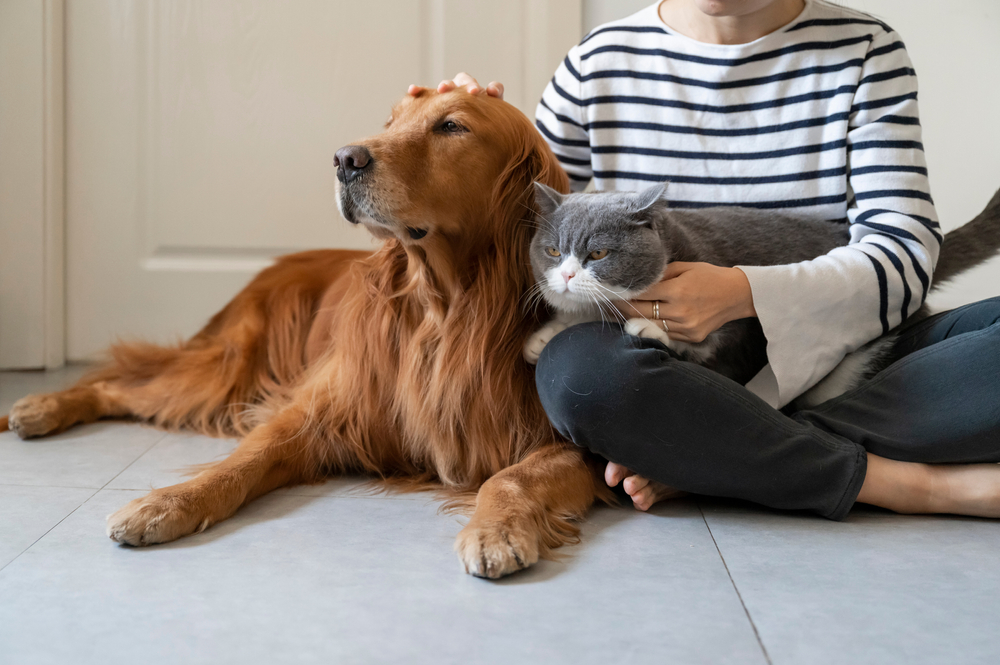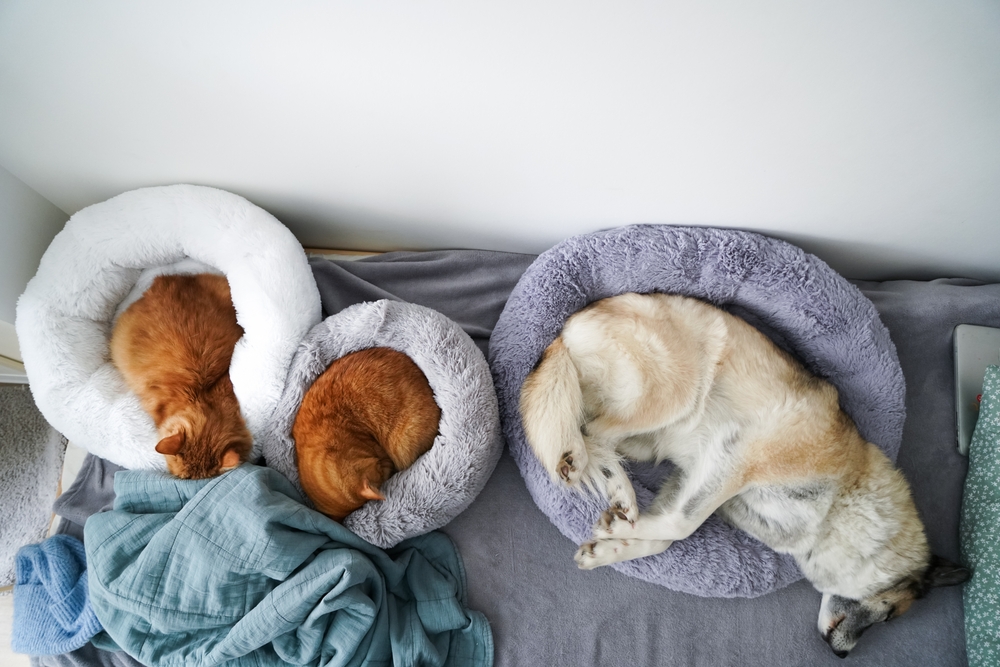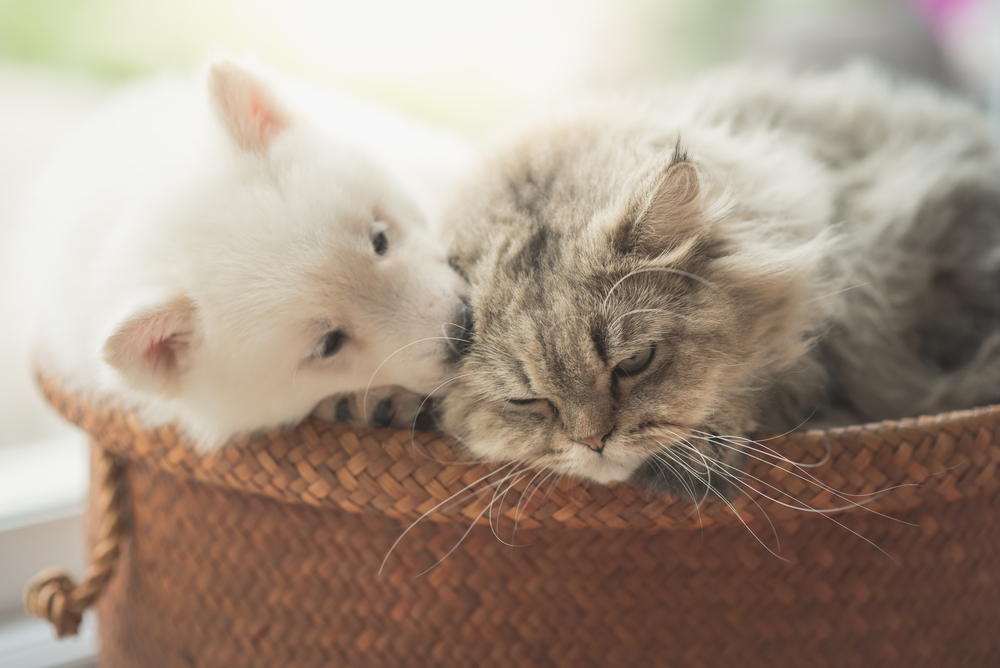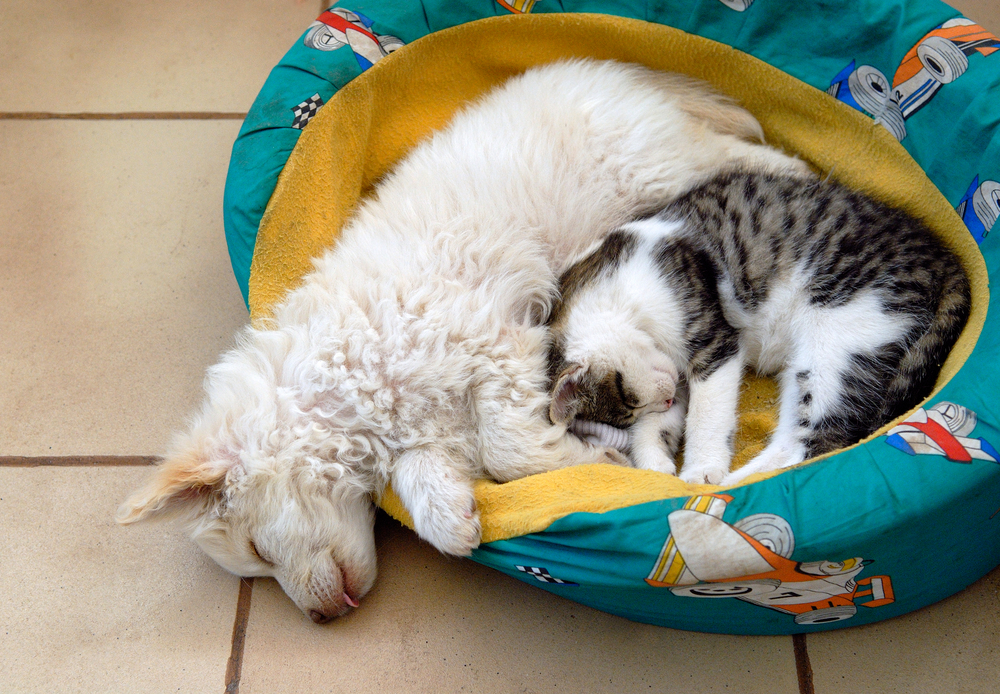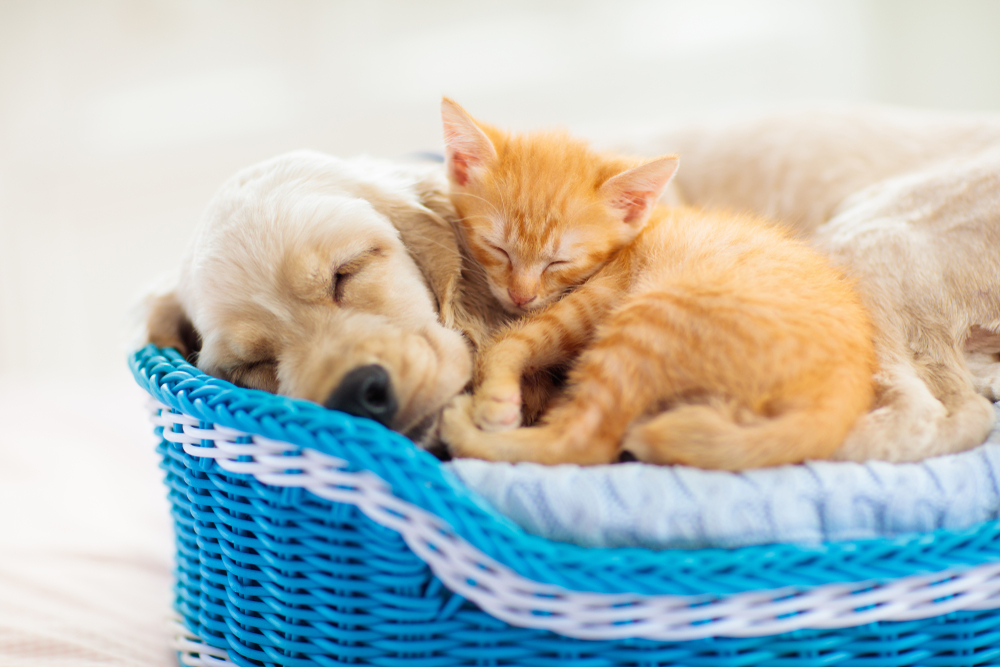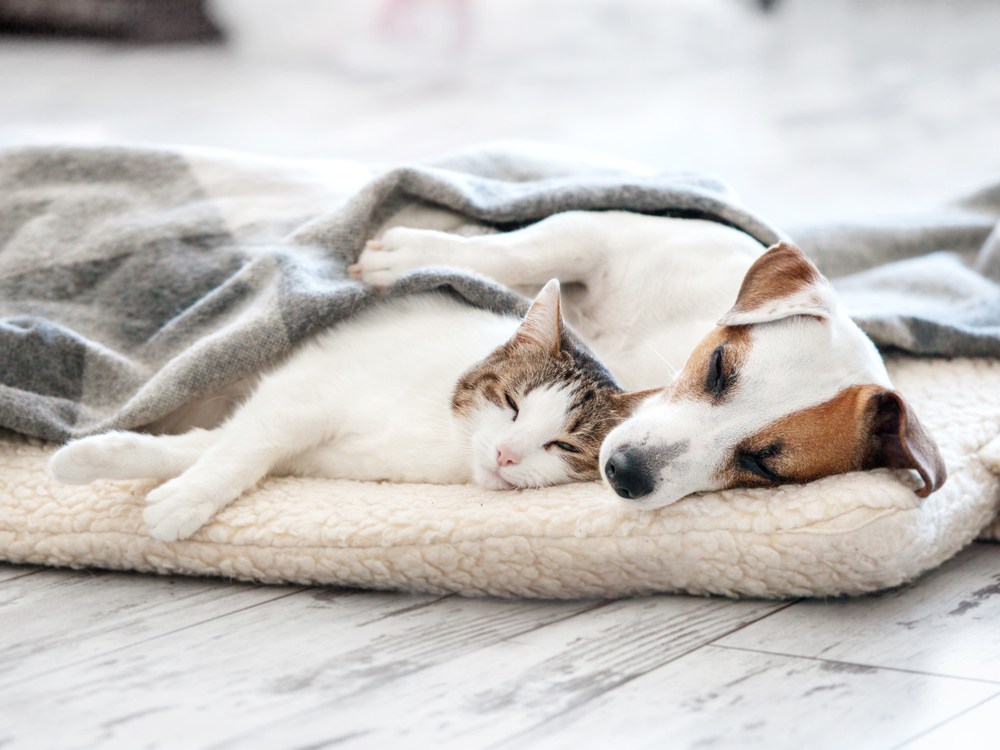📖 Table of Content:
Walking into your living room only to be greeted with the horrific sight of your cat peeing on your dog’s bed is not really the best way to start your day, huh? Ah, the beauty of having pets! Try to calm down, take a deep breath, and let’s discuss this strange behavior together.
Your puppy absolutely loves his soft bed, where he curls up for a well-deserved nap after a day filled with adventures. But there’s someone who simply can’t sit and watch him enjoy his safe haven and his human mamma’s unconditional love… Your kitty had to take matters into her own paws.
Okay, jealousy isn’t the only possible reason your cat peed on your dog’s bed. Our feline friends aren’t always the bad guys! Let’s not forget that cats are creatures of habit. They have their preferred spots for eating, sleeping, and yes, even peeing.
If your kitty answers her nature’s call somewhere else, it may be a sign you need to clean her litter box, or something entirely different. With our feline friends, you never know! No matter what it is, however, it’s definitely not something to be ignored.
Before you start pulling your hair out in frustration or reaching for the cleaning supplies, remember that patience and understanding are key when dealing with your furry companion. Luckily, we’re here to help you understand this odd behavior and support your dear fluff.
Why does my cat pee on the dog’s bed?
So, you noticed your cat keeps peeing on your dog’s bed, now what? Your first feeling is probably frustration, and I completely get that. This isn’t how you imagined your day to go. But our furkids are full of surprises, and often not very pleasant ones.
Remember, never let your anger out on your dear fluff. You’ll cause even more issues, and your cat may begin to fear you. That’s definitely not what you want your relationship to be like.
Next time you catch your cat engaging in this behavior, take a deep breath and remember that she’s trying to tell you something. If you’d like to know what your cat is trying to communicate, keep on reading, and let’s find out together.
1. Your diva may be jealous
Uh-oh, looks like we’ve got a case of kitty jealousy on our hands! Although our furbabies may not show it in the same way we do, trust me, they can definitely feel jealousy when they see us showing attention to someone else.
And guess what? That someone else may just be your new furry addition – the puppy! You brought home an adorable, energetic pup who demands your time and energy. Naturally, you spend a lot of your time walking, training, and playing with your new canine companion.
But, before this doggo came along, your cat had the luxury of having you all to herself. Your lap was her throne, and she could effortlessly ask for playtime whenever she was bored.
Now, with all these changes, it’s not surprising that your kitty may be a bit jealous. She may start blaming the doggie for stealing her spot in her home. It’s like when a new baby arrives, and the cat starts feeling left out.
In fact, this jealousy-fueled behavior can happen even if your furry companions have been best buddies for years. If she realizes she’s not getting as much love and attention as she used to, she may decide to leave you a little surprise on her friend’s bed.
If this happens, make sure your cat feels loved and cherished just as much as your doggo. Find ways to spend some quality time with her, and reassure her that she’s still an important part of your family. Just make sure you don’t reward her bad behavior with attention, even if it’s scolding.
2. Your fluff may be stressed out
Your kitto’s change in behavior can be caused by stress and anxiety. Now, understanding what’s causing these emotions is crucial. According to our friends at PDSA, stress can take a real toll on your cat’s quality of life, and even lead to some medical problems.
Every cat is unique and can experience stress for different reasons. More often than not, though, stress is triggered by changes in their environment. They’re creatures of habit, after all, and can be pretty sensitive no matter how brave they want to appear.
If you’ve recently brought a new dog or a baby into the family, this can be a major change for her and one of the reasons your cat is peeing on your dog’s bed. In case nothing major like that happened, think about the time you’ve been spending with your fluff.
Have you been away for a couple of hours? If that’s the case, she may be experiencing separation anxiety. As strange as it may sound, your fluff may be peeing in peculiar places as a way to relieve her anxiety. And this may sound even weirder, but the scent of their own urine can make cats feel safer.
Although eliminating those stress factors and creating a more harmonious environment for your kitty is a good thing to do, it’s crucial that you take her to the vet first. Stress can take a toll on her health, and your kitty may have been feeling unwell for a while now.
3. There’s a chance she’s in heat
If your feline friend hasn’t been spayed, there’s a chance she may be feeling the need to mark her territory. This act of marking, known as spraying, involves depositing small amounts of urine on various surfaces.
As your purrincess grows older, her urge to spray may increase, and you may find her targeting different objects around the house, like the sink, the window sill, or even your dog’s bed.
Spaying or neutering your cat is the best solution for this type of behavior. Not only will this help maintain cleanliness in the home, but it also promotes your kitty’s overall mental and physical well-being.
4. She’s showing who’s the queen of the household
Your cat may be peeing on your dog’s bed because she’s marking what she deems hers. She’s sending a message that the spot in question is in her domain. She could also be doing it to surround herself with her own familiar scent.
If you have multiple kitties, the one that’s peeing on the dog bed may be having a face-off with her feline companion/s and not getting back at the poor doggo. Sometimes, the arrival of a new puppy can shake up the dynamics between cats, causing them to engage in a scent-spraying showdown.
It’s like they’re trying to make sure everyone knows who the true feline queen is. According to research, male cats and those living in multi-cat households are more likely to show off their urine-marking skills than their female counterparts that live in single-cat homes.
There’s a way to deal with this, but you have to be patient and calm. Start by removing any potential stressors and work on reintroducing your cats (or cat) to your dog. It can help with relieving anxiety and help you live in a harmonious, odor-free home.
Add some cat trees, hiding spots, and shelves around the house that can expand your kitty’s territory and give her more options to claim as her own. Plus, it may divert her attention away from your puppy’s bed.
5. Problems with her litter box
Our feline friends are usually pretty clean creatures. They don’t require extensive potty training like dogs do. But if your feline furriend decides that the dog’s bed is her new favorite bathroom spot, it’s time to investigate her litter box situation.
Cleanliness is key when it comes to your kitty’s “business” spot. Make it a habit to clean her litter box regularly, no matter how much you dread it. On top of that, you need to make sure that the litter box you use is the right size for your feline friend.
We all know how picky our furry kings and queens are – not only with their food and favorite napping spots, but also with their litter. If the type you use smells funny or feels weird under her royal paws, there’s a high chance she’ll avoid using her litter box altogether.
6. Health issues
When your kitty’s behavior suddenly changes, especially when it comes to her litter box habits, it’s important to take this situation seriously. The first thing to keep in mind is the possibility of underlying medical issues.
One common reason these changes happen is a urinary tract infection (UTI). It’s important to understand that when your cat chooses to pee on your dog’s bed, it’s not always an intentional act.
Aside from UTIs, other conditions like kidney stones, diabetes, and bladder inflammation can also cause frequent and painful urination, leading to her avoiding using her litter box.
Your cat’s well-being is your biggest priority, so make sure you approach this situation with empathy, and ask your vet for guidance to ensure your furry bestie receives the care and support she needs.
